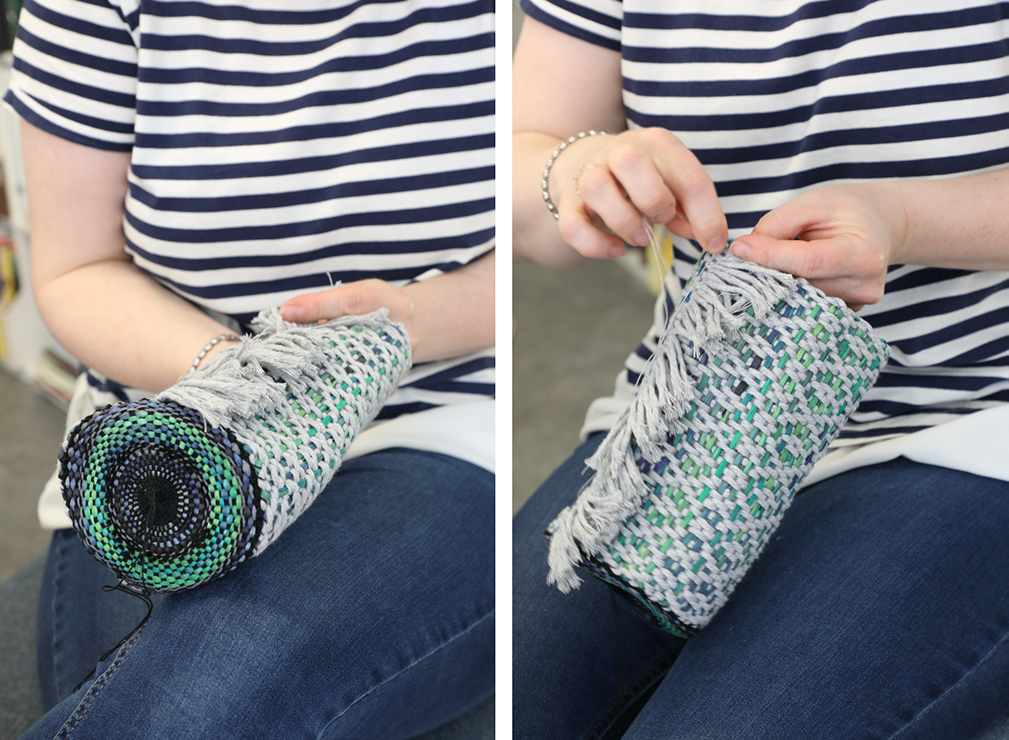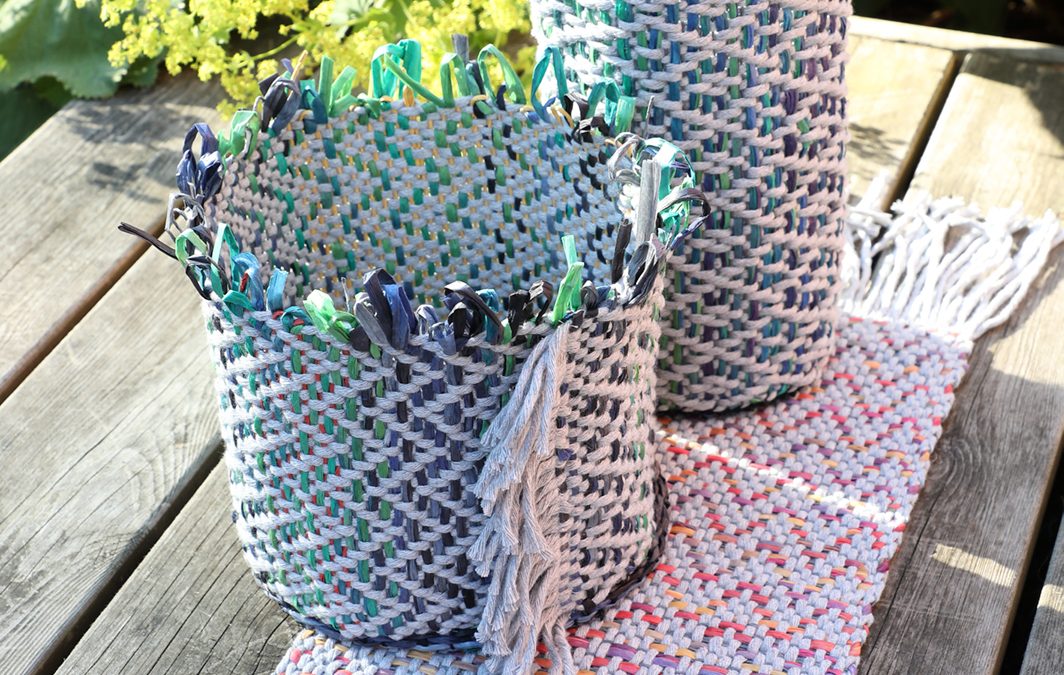We chose a rosebath threading for this pattern which produces more structures than a straight entry. The warp is wound of mop yarn that is also suitable for beginners. The yarn is thick, so there are less warp threads to handle and the fabric is quickly woven. The weft in the baskets and the table runner is flat paper ribbon and paper yarn. The fabric can be washed gently by hand.
Weave the round bottoms of the baskets in the frame! Beautiful colours of the bases come from a variegated paper ribbon. If you want to increase the stability of the bottom, weave two bottom pieces and insert a cardboard or similar between them. Small weaving frames can be found in craft shops and supermarket craft departments.
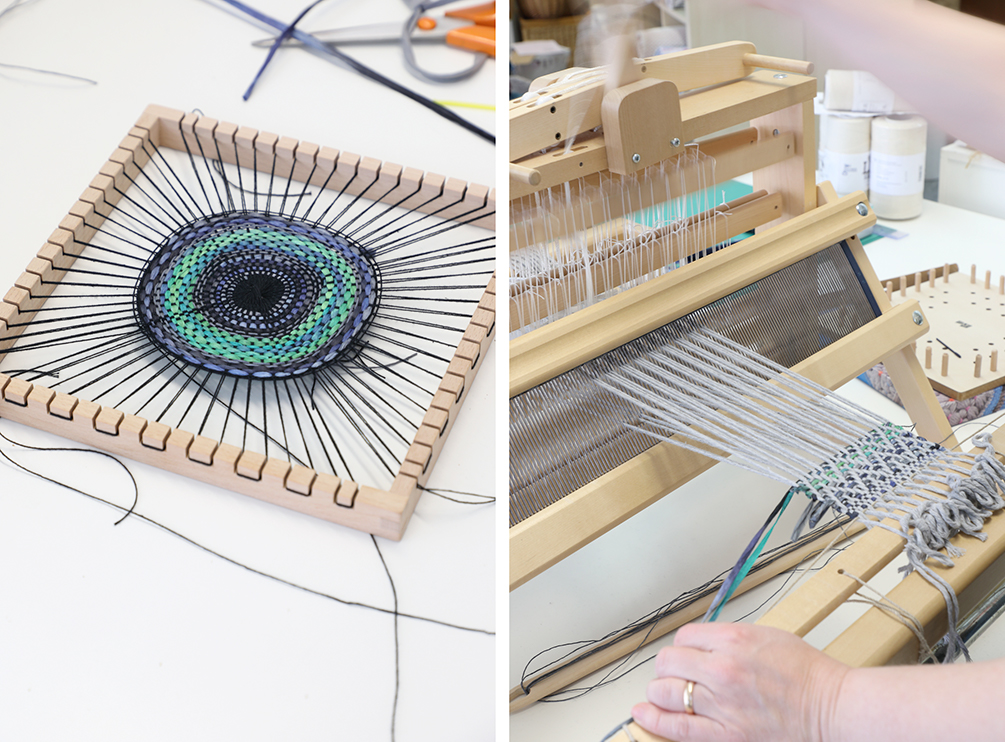
A round weave for the basket base
WEAVING INSTRUCTIONS
A round weave can be woven on a circular or a square weaving frame. We wove the base for the narrow basket on a small square frame purchased from a craft shop and for the wide basket with Prym Loom Maxi square.
The warp: 6-ply black cotton twine, tex 30×6, 1 kg = 5300 m or similar yarn. Slightly elastic and strong yarn is most suitable.
The weft: Flat paper ribbon and paper yarn, also 6-ply cotton twine/warp yarn for the beginning and for ending.
WARPING THE FRAME
Tie a knot around the side of the frame / around one peg. Pull the yarn to the opposite side of the frame and wrap the yarn around the peg and bring back to the left of where you tied on your yarn (counterclockwise). Pull the yarn back to the opposite side of the frame and wrap the yarn around the peg to the right. Continue like this working counterclockwise until all pegs have been wrapped. The threads overlap at the centre of the frame. Tie the yarn end to the side of the frame / around the peg. In the narrow basket, the warp thread is double. There is an example of the start in the photo on the right.
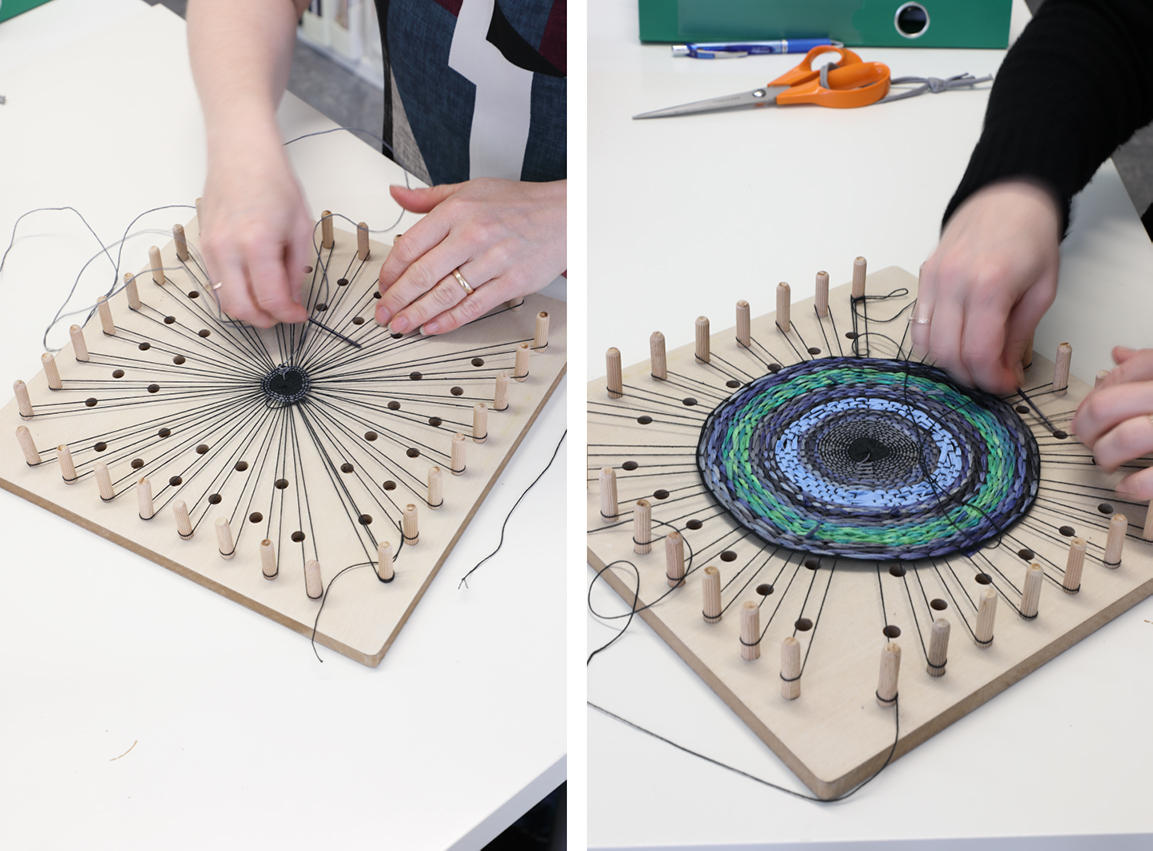
Thread your yarn and go over and under each warp thread, as in a plain weave. To ensure that the plain weave is continued correctly, thread the first and the last warp end as one thread (when there is an even number of warp threads). Start with the same yarn as in the warp and continue for a few rounds with paper yarn. Weave the base using the flat paper ribbon to the desired size. End the weaving with a few rounds of paper yarn and at the very last round weave with the same thread as the warp.
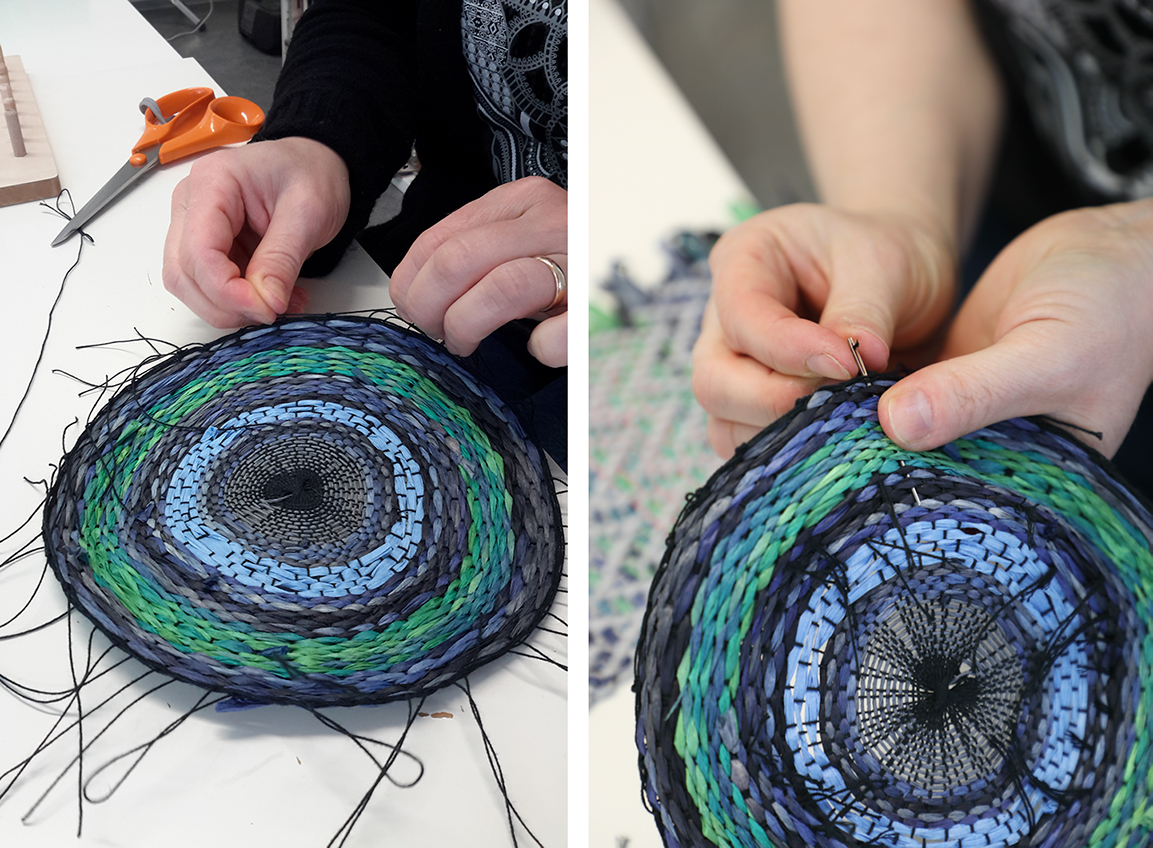
Remove weaving from the frame. Cut the loops and double knot warp threads 1 + 1. Darn warp ends back into the weave parallel with the warp threads. Press the fabric through an ironing cloth.

| The warp | Minimop Cotton Twine 1 kg = n. 700 m circumference approx. 2,5 mm, Lankava |
| Warp | width 20,3 cm (13,7 cm) density 3 threads/cm number of warp ends 61 (41) |
| Length | 2,4 m |
| Reed | 30/1 |
| Weave | Plain weave and twill, a rosepath threading |
We wove first the higher basket and the table runner into the warp. After those woven, we took one repeat (10 and 10 threads) unit away from the warp from both edges. The lower fringe-edged basket is woven into a narrower warp.
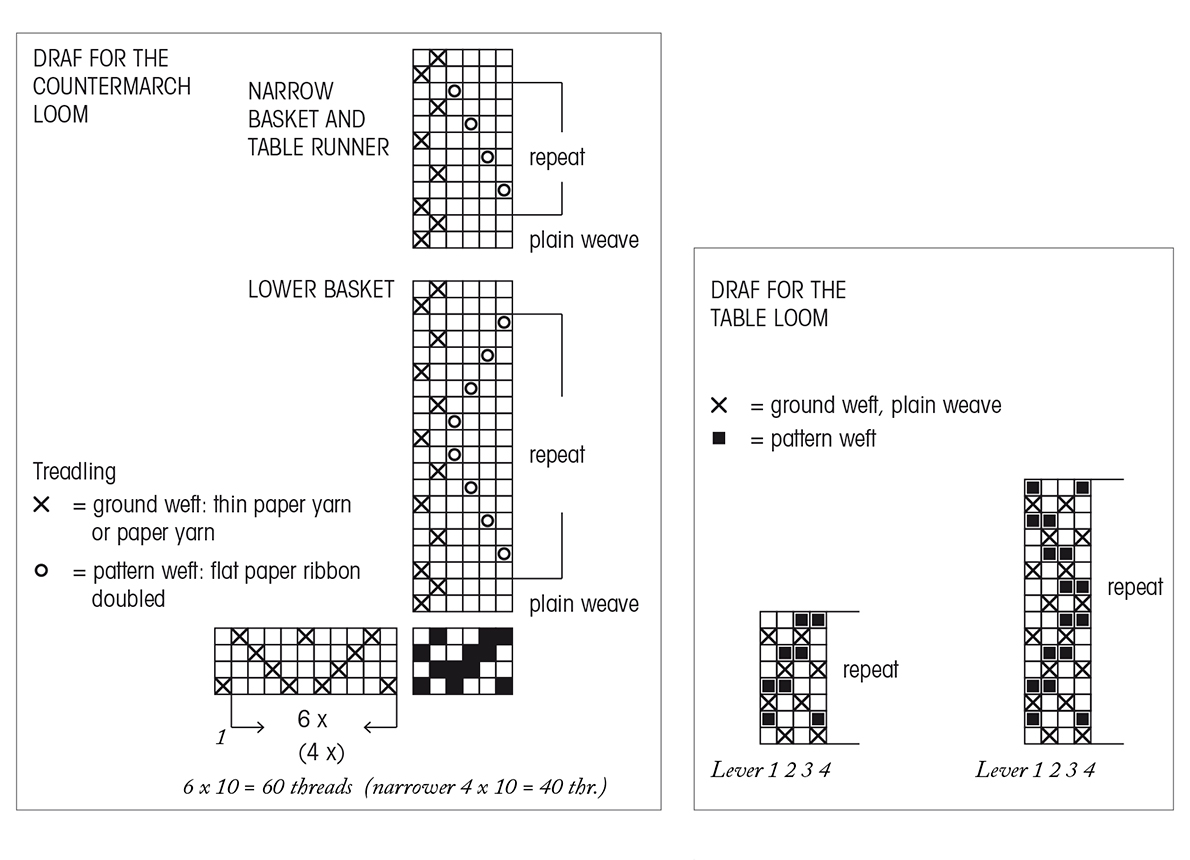
Weaving the basket sides with a table loom
WEAVING INSTRUCTIONS
Leave around 4 cm for the fringe on both ends. Weave the fabric with paper yarn as a plain weave weft and paper ribbon in double as a pattern weft. Start and finish with 3 shots of plain weave with the paper ribbon. Weave the fabric by alternating the paper yarn and the variegated paper ribbon according to the treadling instructions. Change the weft colours after 4 – 8 cm in a free order. Start and finish with the same colour. The density of the weft is 2 plain weave + 2 pattern weft/1 cm.
Take the measure of the circuit of the basket base and weave the fabric to the same length + 1 – 2 cm + plain weave ends.
NB Loosen the warp when measuring the length. 50 cm of woven fabric on the loom was 46,5 cm after it was removed.
DRAFT FOR THE TABLE LOOM
1 = the lever on the left (lifts the furthest shaft in the back), 2 = lever 2 (lifts the second shaft from the back), 3 = lever 3 (lifts the third shaft) and 4 = the lever on the right 4 (lifts the foremost shaft).
Plain weave:
2 ja 4
1 ja 3
Repeat from the beginning.
Diamond pattern:
2 ja 4 tabby weft = ground
1 ja 4 pattern weft = pattern
1 ja 3 ground
1 ja 2 pattern
2 ja 4 ground
2 ja 3 pattern
1 ja 3 ground
3 ja 4 pattern
2 ja 4 ground
3 ja 4 pattern
1 ja 3 ground
2 ja 3 pattern
2 ja 4 ground
1 ja 2 pattern
1 ja 3 ground
1 ja 4 pattern
Repeat from
the begining.
Zigzag pattern:
2 ja 4 tabby weft = ground
1 ja 4 pattern weft = pattern
1 ja 3 ground
1 ja 2 pattern
2 ja 4 ground
2 ja 3 pattern
1 ja 3 ground
3 ja 4 pattern
Repeat from the beginning.
Narrow basket
(The higher) Circumference 33 cm and height 19 cm
The woven length of fabric 35 cm, loose the warp when measuring.
Woven into a warp 20,3 cm wide.
Weave the fabric with a diamond pattern using the thin paper yarn / paper yarn as the ground weft and the double flat paper ribbon as the pattern weft. Wash carefully by hand 30oC.
AMOUNT OF WEFT YARN NEEDED
The pattern weft
Raffia Multi paper yarn (flat paper ribbon), Lankava
100% Recyclable wood fiber (cellulose / Rayon) 35 g = n. 80 m,
05 space dyed green
07 space dyed grey / blue
08 space dyed blue / lilac
14 g in total
The ground weft (plain-weave weft)
Paper yarn Nm 1,65
100 g = 180 m, Lappajärven Värjäämö
16 gray 5 g
The Lower basket
(With fringe)Circumference 51 cm and height 14 cm + loops
The woven length of fabric 54 cm, loose the warp when measuring.
Woven into a warp 13,7 cm wide.
Leave loops of different hights of the paper ribbon on one edge of the fabric. Weave the plain-weave weft as usual to the edge to keep the edge tight. Wash carefully by hand 30oC.
AMOUNT OF WEFT YARN NEEDED
The pattern weft
Raffia Multi paper yarn (flat paper ribbon), Lankava
100% Recyclable wood fiber (cellulose / Rayon) 35 g = n. 80 m,
05 space dyed green
07 space dyed grey / blue
17 g in total
The ground weft
Paper yarn Nm 1,65
100 g = 180 m, Lappajärven Värjäämö
16 grey 5 g
and
Thin paper yarn 0,8
200 g = 175 m, Lappajärven Värjäämö
yellow
orange
6 g in total
Small table runner
Finished size 18,5 x 30 cm + fringe á 9 cm
Woven into a warp 20,3 cm wide.
Leave 9 cm for the fringe on both ends. Weave the table runner occording to the tredling instructions using the gray paper yarn as the plain-weave weft and the double flat paper ribbon as the pattern weft. The woven length is 35 cm. Wash carefully by hand 30oC.
AMOUNT OF WEFT YARN NEEDED
Paper yarn Nm 1,65
100 g = 180 m, Lappajärven Värjäämö
16 gray 4 g
Raffia Multi paper yarn (flat paper ribbon), Lankava
100% Recyclable wood fiber (cellulose / Rayon)
35 g = n. 80 m,
01 rainbow 10 g

Finishing the baskets
FINISHING THE FABRIC
Sew a straight stitch to the end of the fabric with a sewing machine. Press the fabric through the damp ironing cloth.
SEWING THE BASKETS
Fasten the fabric with pins from one edge to the bottom piece, overlap the ends of the fabrics. The circumference of the basket can be adjusted by increasing or decreasing the overlapping. Sew the fabric by hand to the bottom using warp yarn or other strong thread of appropriate colour.
